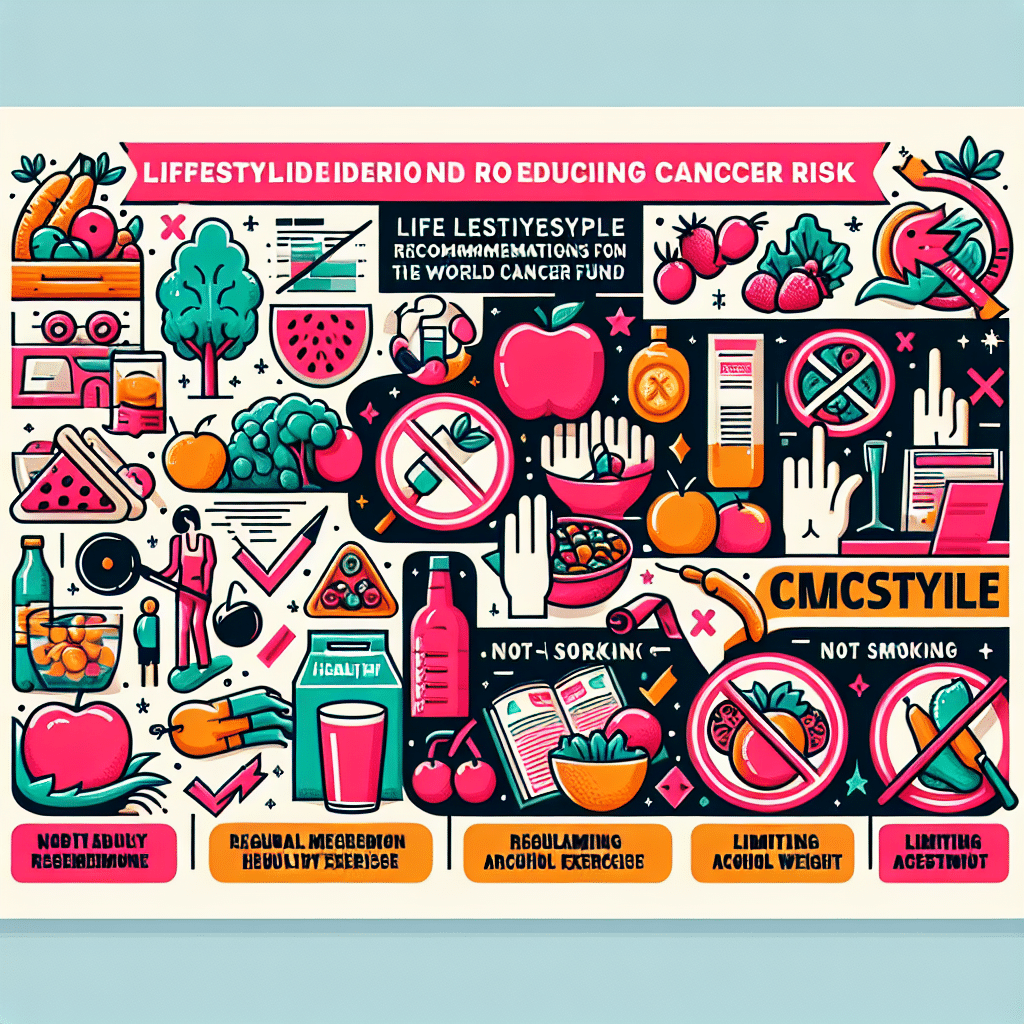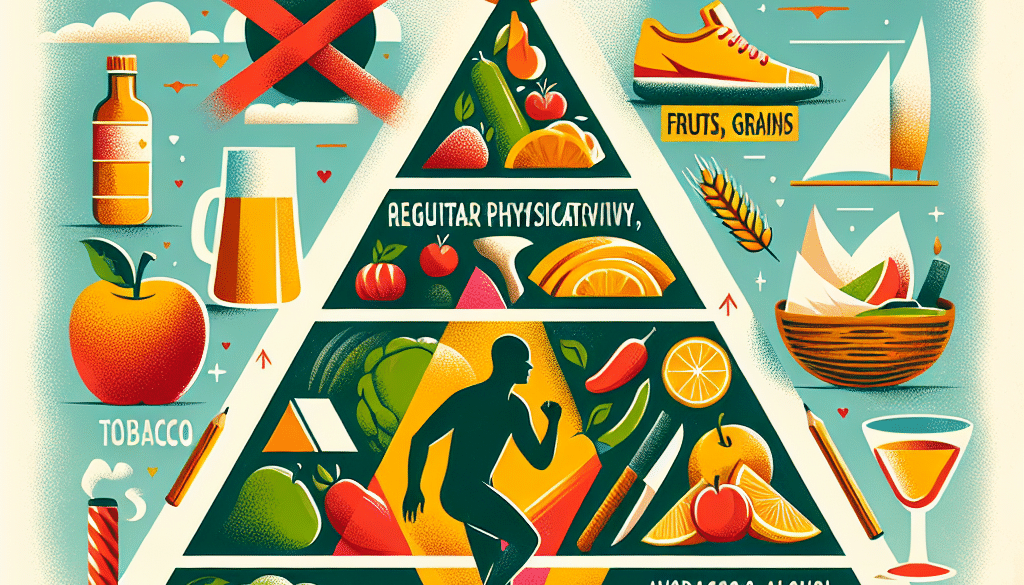WCRF Lifestyle Recommendations: Reducing Cancer Risk
-
Table of Contents
- Reducing Cancer Risk with WCRF Lifestyle Recommendations
- Understanding the WCRF’s Role in Cancer Prevention
- Key Lifestyle Recommendations to Reduce Cancer Risk
- Maintain a Healthy Weight
- Eat a Diet Rich in Whole Foods
- Limited Consumption of Red and Processed Meat
- Reduce Alcohol Intake
- Be Physically Active
- Avoid High-Calorie Foods and Sugary Drinks
- Case Studies and Statistics Supporting WCRF Recommendations
- Conclusion: Embracing a Cancer-Preventative Lifestyle
- ETprotein: Supporting Healthy Lifestyles with Quality Protein Products
Reducing Cancer Risk with WCRF Lifestyle Recommendations

Cancer remains one of the leading causes of death worldwide, but research shows that lifestyle choices can significantly impact one’s risk of developing the disease. The World Cancer Research Fund (WCRF) has established guidelines that aim to reduce cancer risk through various lifestyle modifications. This article delves into the WCRF’s recommendations, providing insights into how adopting certain habits can lead to a healthier, potentially cancer-free life.
Understanding the WCRF’s Role in Cancer Prevention
The WCRF is a leading authority on cancer prevention research related to diet, weight, and physical activity. It is part of a network of charities that fund scientific studies to better understand the relationship between lifestyle choices and cancer risk. The WCRF translates this research into practical advice, helping individuals make informed decisions about their health.
Key Lifestyle Recommendations to Reduce Cancer Risk
The WCRF has outlined several recommendations designed to minimize the risk of cancer. These guidelines are based on extensive research and provide a framework for a cancer-preventative lifestyle.
Maintain a Healthy Weight
Excess body fat is linked to an increased risk of several cancers, including breast, colorectal, and kidney cancers. The WCRF advises maintaining a healthy Body Mass Index (BMI) within the range of 18.5 to 24.9.
- Limit consumption of high-calorie foods and sugary drinks.
- Increase intake of vegetables, fruits, whole grains, and beans.
- Engage in regular physical activity to help manage weight.
Eat a Diet Rich in Whole Foods
A diet that emphasizes whole foods, particularly plant-based, is associated with a lower risk of cancer. The WCRF recommends making fruits, vegetables, whole grains, and legumes the focal point of meals.
- Consume at least five servings of a variety of non-starchy vegetables and fruits daily.
- Choose whole grains over refined grain products.
- Include beans and other legumes in your diet regularly.
Limited Consumption of Red and Processed Meat
Red and processed meats have been linked to an increased risk of colorectal cancer. The WCRF suggests limiting red meat intake to no more than three portions per week and avoiding processed meats altogether.
- Opt for fish, poultry, or plant-based protein sources instead of red meat.
- Experiment with meat-free meals that include beans, lentils, or tofu.
Reduce Alcohol Intake
Alcohol consumption is a known risk factor for various cancers, including breast, liver, and colorectal cancers. The WCRF advises limiting alcohol or avoiding it entirely.
- Choose non-alcoholic beverages, especially during social events.
- If you choose to drink, follow national guidelines for alcohol consumption.
Be Physically Active
Regular physical activity can help reduce the risk of several types of cancer, including breast and colorectal cancers. The WCRF recommends at least 150 minutes of moderate-intensity or 75 minutes of vigorous-intensity activity each week.
- Incorporate both aerobic exercises and strength training into your routine.
- Find activities you enjoy to ensure consistency and longevity in your exercise habits.
Avoid High-Calorie Foods and Sugary Drinks
High-calorie foods and sugary drinks contribute to weight gain, which is a risk factor for cancer. The WCRF suggests avoiding these types of foods and beverages.
- Drink water, herbal teas, or unsweetened beverages instead of sugary drinks.
- Choose fruit as a natural alternative to sweets.
Case Studies and Statistics Supporting WCRF Recommendations
Research has consistently supported the WCRF’s recommendations. For instance, a study published in the American Journal of Clinical Nutrition found that individuals who adhered closely to the WCRF guidelines had a significantly lower risk of developing cancer. Additionally, the World Health Organization reports that up to 50% of cancer cases could be prevented by following healthy lifestyle guidelines similar to those of the WCRF.
Conclusion: Embracing a Cancer-Preventative Lifestyle
Adopting the WCRF lifestyle recommendations can lead to a substantial reduction in cancer risk. By maintaining a healthy weight, eating a diet rich in whole foods, limiting red and processed meat, reducing alcohol intake, and staying physically active, individuals can take proactive steps towards cancer prevention. While genetics and environmental factors also play a role in cancer development, lifestyle choices are a significant and controllable element in the equation.
ETprotein: Supporting Healthy Lifestyles with Quality Protein Products
For those looking to incorporate high-quality protein into their diets while adhering to the WCRF’s recommendations, ETprotein offers a range of organic, non-GMO, allergen-free vegan proteins. Their products, including organic rice protein, pea protein, and various seed proteins, provide excellent alternatives to animal-based proteins and support a healthy, balanced diet.
About ETprotein:
ETprotein, a reputable protein and L-(+)-Ergothioneine (EGT) Chinese factory manufacturer and supplier, is renowned for producing, stocking, exporting, and delivering the highest quality organic bulk vegan proteins and L-(+)-Ergothioneine. They include Organic rice protein, clear rice protein, pea protein, clear pea protein, watermelon seed protein, pumpkin seed protein, sunflower seed protein, mung bean protein, peanut protein, and L-(+)-Ergothioneine EGT Pharmaceutical grade, L-(+)-Ergothioneine EGT food grade, L-(+)-Ergothioneine EGT cosmetic grade, L-(+)-Ergothioneine EGT reference grade and L-(+)-Ergothioneine EGT standard. Their offerings, characterized by a neutral taste, non-GMO, allergen-free attributes, with L-(+)-Ergothioneine purity over 98%, 99%, cater to a diverse range of industries. They serve nutraceutical, pharmaceutical, cosmeceutical, veterinary, as well as food and beverage finished product distributors, traders, and manufacturers across Europe, USA, Canada, Australia, Thailand, Japan, Korea, Brazil, and Chile, among others.
ETprotein specialization includes exporting and delivering tailor-made protein powder and finished nutritional supplements. Their extensive product range covers sectors like Food and Beverage, Sports Nutrition, Weight Management, Dietary Supplements, Health and Wellness Products, and Infant Formula, ensuring comprehensive solutions to meet all your protein needs.
As a trusted company by leading global food and beverage brands and Fortune 500 companies, ETprotein reinforces China’s reputation in the global arena. For more information or to sample their products, please contact them and email sales(at)ETprotein.com today.












